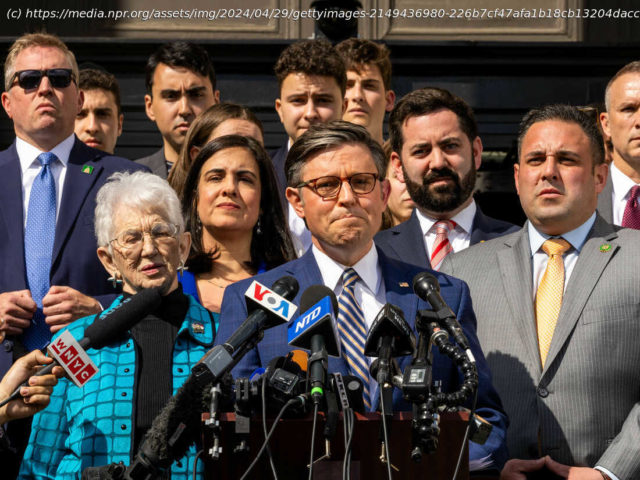House Speaker Mike Johnson met with a group of Jewish students at Columbia University who say they’ve experienced antisemitic speech and harassment from protesters on and off campus.
The House of Representatives passed a bill on Wednesday aimed at addressing reports of rising antisemitism on college campuses, where activists angered by Israel’s war against Hamas have been protesting for months and more recently set up encampments on campus grounds.
The Antisemitism Awareness Act would see the adoption of the International Holocaust Remembrance Alliance’s definition of antisemitism for the enforcement of federal anti-discrimination laws regarding education programs.
The bill passed with a 320-91 vote. Seventy Democrats and 21 Republicans voted against the measure.
The international group defines antisemitism as “a certain perception of Jews, which may be expressed as hatred toward Jews” and gives examples of the definition’s application, which includes “accusing Jews as a people of being responsible for real or imagine wrongdoing committed by a single Jewish person or group” and making ” dehumanizing, demonizing, or stereotypical allegations about Jews as such or the power of Jews as collective.”
Rep. Mike Lawler, R-N.Y., introduced the legislation.
“Right now, without a clear definition of antisemitism, the Department of Education and college administrators are having trouble discerning whether conduct is antisemitic or not, whether the activity we’re seeing crosses the line into antisemitic harassment,” he said on the House floor before passage.
The bill goes further than an executive order former President Donald Trump signed in 2019. Opponents argue the measure could restrict free speech.
“This definition adopted by the International Holocaust Remembrance Alliance includes ‘contemporary examples of antisemitism’,” said Rep. Jerry Nadler in a speech on the House floor ahead of the vote. “The problem is that these examples may include protected speech in some context, particularly with respect to criticism of the state of Israel.”
Fellow New York Democrat Rep. Ritchie Torres, one of the 15 Democratic cosponsors of the bill, told NPR he finds that argument unconvincing.
“There’s a false narrative that the definition censors criticism of the Israeli government. I consider it complete nonsense,” Torres said in an interview with NPR.
“If you can figure out how to critique the policies and practices of the Israeli government without calling for the destruction of Israel itself, then no reasonable person would ever accuse you of antisemitism,” he added.Issue should ‘transcend partisan politics’
While members of both parties have criticized reports of antisemitism at the protests, Republicans have made the issue a central political focus.
House Speaker Mike Johnson made a rare visit last week to Columbia University, where demonstrators were demanding the school divest from companies that operate in Israel. Johnson and a handful of GOP lawmakers met with a group of Jewish students.
“They are really concerned that their voices are not being heard when they may complain about being assaulted, being spit on, being told that all Jews should die — and they are not getting any response from the individuals who are literally being paid to protect them,” Rep. Anthony D’Esposito, R-N.Y., told NPR of the meeting.
On Tuesday, Johnson held a press conference focused on antisemitism with a group of House Republicans at the U.S. Capitol.
“Antisemitism is a virus and it will spread if it’s not stamped out,” Johnson said. “We have to act, and House Republicans will speak to this fateful moment with moral clarity.






